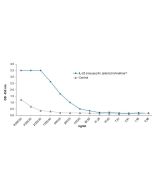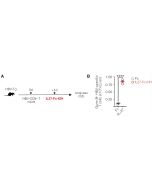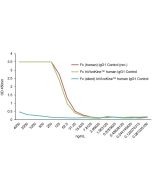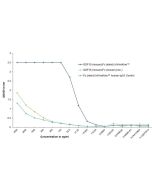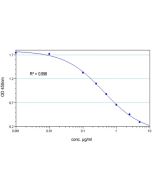Cookie Policy: This site uses cookies to improve your experience. You can find out more about our use of cookies in our Privacy Policy. By continuing to browse this site you agree to our use of cookies.
AdipoGen Life Sciences
Irisin (monomer):Fc (silent) InVivoKine™
Replaces AG-40B-0115
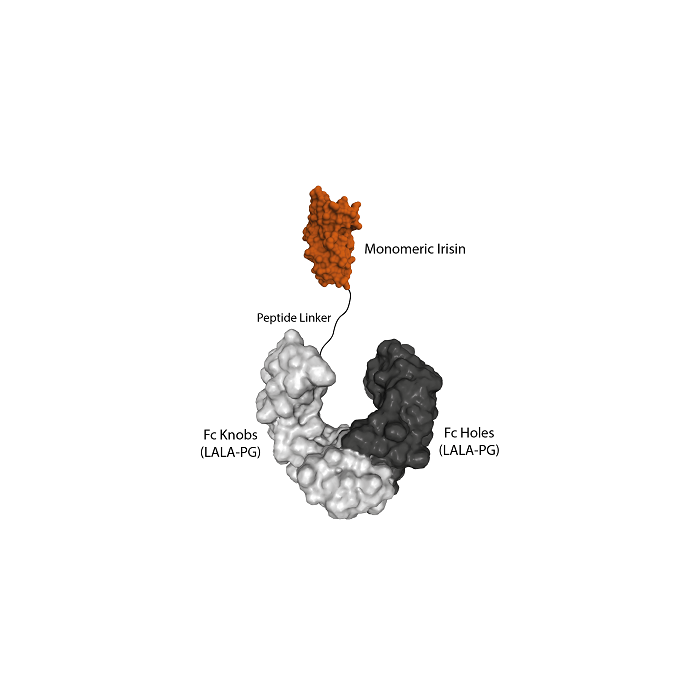
| Product Details | |
|---|---|
| Synonyms | Fc (LALA-PG)-KIH (human):Fibronectin Type III Domain-containing Protein 5 (cleaved); Fibronectin Type III Repeat-containing Protein 2 (cleaved); FNDC5 (cleaved) |
| Product Type | Protein |
| Properties | |
| Source/Host | HEK 293 cells. Produced using animal component-free medium. |
| Sequence |
Fc (LALA-PG) Knobs:Irisin (human, aa 32-143 /mouse, aa 29-140) and Fc (LALA-PG) Holes form the Irisin (monomer):Fc (silent) InVivoKine™ using the Knobs-into-Holes technology (see reference: J.B. Ridgway, et al.; Protein Eng. 9, 617 (1996)). |
| Crossreactivity |
Human Monkey Mouse Rat |
| Specificity |
The Fc contains the mutations LALA-PG that abolish the interaction between the Fc and FcγRs and therefore Fc undesirable effects. The Fc (LALA-PG) is named Fc (silent). |
| Biological Activity |
Triggers p38 phosphorylation in 3T3-L1 cells. |
| MW | ~55kDa and 30 kDa (SDS-PAGE) |
| Purity | ≥95% (SDS-PAGE) |
| Endotoxin Content | <0.01EU/μg purified protein (LAL test). |
| Concentration | 1mg/ml after reconstitution. |
| Reconstitution | Reconstitute with 50μl endotoxin-free water. |
| Accession Number | Q8NAU1 |
| Formulation | Lyophilized. Contains PBS |
| Protein Negative Control |
Fc (silent) InVivoKine™ human IgG1 Control (Prod. No. AG-35B-0018) |
| Other Product Data |
Uni-Prot link Q8NAU1: Irisin |
| Shipping and Handling | |
| Shipping | BLUE ICE |
| Short Term Storage | +4°C |
| Long Term Storage | -20°C |
| Handling Advice |
After reconstitution, prepare aliquots and store at -20°C. Avoid freeze/thaw cycles. Centrifuge lyophilized vial before opening and reconstitution. PBS containing at least 0.1% BSA should be used for further dilutions. |
| Use/Stability |
Stable for at least 6 months after receipt when stored at -20°C. Working aliquots are stable for up to 3 months when stored at -20°C. |
| Documents | |
| MSDS |
 Download PDF Download PDF |
| Product Specification Sheet | |
| Datasheet |
 Download PDF Download PDF |
Irisin is a recently described exercise-induced hormone secreted by skeletal muscle in mice and humans. Irisin activates beige fat cells (beige cells have a gene expression pattern distinct from either white or brown fat and are preferentially sensitive to the polypeptide hormone Irisin). Irisin is cleaved from the type I membrane protein FNDC5 and improves systemic metabolism by increasing energy expenditure. Upon exercise, FNDC5 expressed by skeletal muscles is proteolytically processed and secreted as the myokine Irisin, which has several functions: i) it contributes to the conversion of white fat to higher oxygen consumable brown fat (also called beige fat) in response to exercise; ii) it regulates bone mineral density and bones remodeling; and iii) it increases synaptic plasticity and rescues memory and cognitive function of the brain in mouse models of Alzheimer’s disease. Irisin not only plays a vital role in energy metabolism but also has crucial roles in a variety of processes such as inflammation, proliferation, metastasis, aging and neural differentiation.
The Irisin (monomer):Fc (silent) InVivoKine™ is produced by using two different vectors, one encoding for the Fc Knobs (LALA-PG) (human):Irisin sequence (synthesizing a protein of 55kDa) and one encoding for the Fc Holes (LALA-PG) sequence (synthesizing a protein of 30kDa). Both vectors transfected into HEK293 cells produce both Fc molecules (Knobs-into-Holes technology; J.B. Ridgway, et al.; Protein Eng. 9, 617 (1996)) required for dimerization and for secretion of the final protein Irisin (monomer):Fc (silent) InVivoKine™. The LALA-PG mutations inhibit binding to FcγRs and C1q while FcRn binding and Fc stability remain unaffected.
The protein Fc (LALA-PG)-KIH (human):Irisin (monomeric) (rec.) is a unique highly active monomeric construct for in vivo studies. Due to its increased stability and half-life, it is an ideal tool for transitional research.
InVivoKines™ are a new generation of recombinant fusion proteins for immunotherapeutic, preclinical and translational in vivo research, developed and manufactured by AdipoGen Life Sciences.






